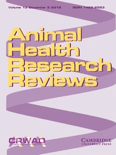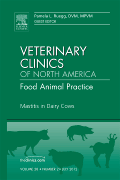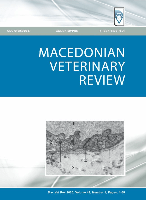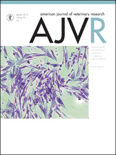
REVUE SCIENTIFIQUE ET TECHNIQUE-OFFICE INTERNATIONAL DES EPIZOOTIES
Scope & Guideline
Empowering Knowledge in Animal Science and Medicine
Introduction
Aims and Scopes
- Animal Health Surveillance and Monitoring:
The journal emphasizes the importance of surveillance systems for early detection and management of infectious diseases in wildlife and livestock, reflecting a growing recognition of the interconnectedness of animal health, human health, and environmental health. - Data-Driven Approaches:
A core focus is on the utilization of big data and informatics to enhance decision-making in animal health. This includes the integration of diverse data sources to better understand disease dynamics and improve policy responses. - Antimicrobial Resistance and Usage:
There is a consistent focus on monitoring antimicrobial use in animals and the implications for resistance, highlighting the need for integrated surveillance systems to mitigate public health risks. - Policy and Economic Implications:
The journal explores the economic evaluations related to animal health interventions and the role of Veterinary Services in shaping policies that impact animal production and health. - Innovations in Diagnostic Technologies:
The journal showcases advancements in diagnostic methods and technologies, emphasizing the importance of accurate and timely diagnosis in managing animal diseases.
Trending and Emerging
- One Health Integration:
There is a marked increase in publications that emphasize the One Health approach, which considers the interconnectedness of animal, human, and environmental health, highlighting its importance in addressing global health issues. - Big Data and Informatics in Animal Health:
The journal is increasingly focusing on the role of big data and informatics, showcasing how these tools can enhance disease surveillance, inform policy, and improve veterinary practices. - Emerging Infectious Diseases:
Recent themes reflect a growing concern over emerging infectious diseases in livestock and wildlife, with an emphasis on proactive surveillance and risk assessment methodologies. - Antimicrobial Stewardship:
The topic of antimicrobial stewardship is gaining traction, with more studies addressing integrated surveillance systems and strategies to manage antimicrobial resistance effectively. - Economic Evaluation in Veterinary Services:
There is a rising trend in publications that evaluate the economic implications of veterinary interventions, reflecting a broader interest in the sustainability and efficiency of animal health systems.
Declining or Waning
- Traditional Veterinary Practices:
Papers focusing on conventional veterinary practices and treatments seem to be less frequent, possibly due to the increasing emphasis on innovative approaches and technology-driven solutions. - General Animal Welfare Topics:
Although animal welfare remains a critical component of veterinary services, specific discussions on general welfare issues have decreased, with a shift towards more integrated and data-driven perspectives. - Specific Zoonotic Disease Focus:
There appears to be a waning interest in narrowly focused studies on specific zoonotic diseases, as the journal shifts towards broader themes of integrated surveillance and One Health approaches.
Similar Journals

ISRAEL JOURNAL OF VETERINARY MEDICINE
Transforming Veterinary Science with Cutting-Edge ResearchThe Israel Journal of Veterinary Medicine, published by the Israel Veterinary Medical Association, serves as a vital resource for researchers, professionals, and students in the fields of veterinary medicine and animal science. With a commitment to advancing knowledge across diverse veterinary disciplines, this journal plays a crucial role in disseminating significant findings and innovations that influence both local and global veterinary practices. Although it currently holds a Q4 ranking in both the Animal Science and Zoology and Veterinary (miscellaneous) categories, the journal's open access policy, enabling free availability of articles, aspires to increase its accessibility and engagement among the academic community. The journal's convergence of research from 2007 to 2024 showcases its dedication to continuously contributing to the evolving landscape of veterinary science.

Thai Journal of Veterinary Medicine
Cultivating excellence in veterinary medicine across Thailand.Thai Journal of Veterinary Medicine, published by Chulalongkorn University, serves as a vital resource for researchers, practitioners, and students in the field of veterinary science. With an ISSN of 0125-6491, the journal has been providing a platform for the dissemination of original research and reviews since its inception, with a focus on advancing veterinary practice and animal health in Thailand and the broader Southeast Asian region. The journal is recognized in the Scopus database, currently ranked in the Q4 category for Veterinary (miscellaneous), reflecting its commitment to quality despite being in a highly competitive space. The scope of the journal encompasses a wide array of topics pertinent to veterinary medicine, ensuring accessibility to diverse veterinary disciplines. While the journal currently does not offer an open-access option, it remains dedicated to contributing valuable knowledge and insights to the veterinary community, supporting the improvement of animal welfare and public health initiatives in the region. As it continues to publish until 2024, the Thai Journal of Veterinary Medicine invites contributions that align with its objectives of fostering scholarly discourse and advancing veterinary research.

ANIMAL HEALTH RESEARCH REVIEWS
Elevating standards in animal welfare with every review.ANIMAL HEALTH RESEARCH REVIEWS, published by CAMBRIDGE UNIVERSITY PRESS, stands as a premier journal dedicated to advancing the field of animal health and welfare. With an impressive Scopus rank of #22 out of 490 in the domain of Animal Science and Zoology, placing it in the 95th percentile, this journal has established itself as a crucial resource for researchers and professionals alike. Covering the evolving landscape of animal health from 1996 to the present, it offers comprehensive reviews that synthesize current research, aiming to inform practices and policies in the animal health sector. Although it operates under a subscription model, the journal promotes access to cutting-edge findings and discussions. As a recognized publication in the Q1 category for 2023, it continues to set high standards for scholarship in animal science, making it an indispensable tool for those committed to advancing knowledge and practice in the field.

VETERINARY CLINICS OF NORTH AMERICA-FOOD ANIMAL PRACTICE
Fostering Excellence in Veterinary Care for Food AnimalsVETERINARY CLINICS OF NORTH AMERICA-FOOD ANIMAL PRACTICE is a premier peer-reviewed journal dedicated to advancing knowledge in the field of food animal veterinary medicine. Published by W B SAUNDERS CO-ELSEVIER INC, this journal serves as a vital resource for veterinarians, researchers, and students, facilitating the dissemination of high-quality, impactful research and reviews. With an impressive Q1 ranking in both the fields of Food Animals and Medicine, and a notable Scopus rank of 2 out of 39 in Veterinary Food Animals, the journal plays a critical role in addressing the complexities and advancements in food animal health. Although it is not an Open Access journal, subscribers have access to a wealth of articles that are pivotal to the profession. Founded in 1971, the journal continues to provide cutting-edge insights and support for effective practices in veterinary medicine through 2024 and beyond. Its commitment to excellence and relevance ensures it remains an indispensable source for the latest developments in the veterinary field.

Revista Romana de Medicina Veterinara
Fostering collaboration for veterinary advancements.Revista Romana de Medicina Veterinara is a leading peer-reviewed journal dedicated to the field of veterinary medicine, published by the General Association of Romanian Veterinarians. With its ISSN 1220-3173 and E-ISSN 2457-7618, the journal aims to advance the domain of veterinary science through dissemination of high-quality research articles, case studies, and reviews that cover a wide array of topics including animal health, veterinary diagnostics, and treatment methodologies. Although primarily focused on the Romanian veterinary landscape, its scope is designed to engage a global audience of researchers, practitioners, and students seeking to enhance their knowledge and practice in veterinary medicine. The journal is committed to open accessibility, ensuring that vital research is readily available to the academic community without financial barriers, thereby encouraging collaboration and innovation. By providing a platform for cutting-edge veterinary research, Revista Romana de Medicina Veterinara plays a crucial role in fostering advancements that can significantly impact animal health and welfare both locally and internationally.

JAPANESE JOURNAL OF VETERINARY RESEARCH
Nurturing knowledge for the advancement of veterinary science.The Japanese Journal of Veterinary Research, published by Hokkaido University, is a pivotal resource in the field of veterinary science, focusing on a wide array of topics that contribute to the advancement of veterinary research. Established in 1965, this esteemed journal has been at the forefront of disseminating innovative research findings and methodologies crucial for animal health and welfare in Japan and beyond. With an ISSN of 0047-1917 and recognized in the Q3 quartile of veterinary journals, it serves as a significant platform for both established researchers and emerging scholars, fostering a collaborative environment that aims to elevate veterinary practice. Although it operates under a traditional subscription model without open access, the journal's selectivity and rigorous peer-review process enhance the quality of published works, attracting attention from global audiences. Based in Sapporo, Japan, the journal continually strives to provide a vital forum for discussions that shape the future of the veterinary profession.

Macedonian Veterinary Review
Connecting researchers to elevate veterinary practices.Macedonian Veterinary Review is a prominent open access journal dedicated to advancing the field of veterinary science. Published by SCIENDO, this journal provides a crucial platform for researchers, professionals, and students to share their findings and insights related to veterinary practices, animal health, and welfare. Established with the aim of fostering knowledge exchange since its inception in 2010, the journal has made significant strides, evidenced by its 2023 Scopus ranking of #131 out of 194 in the General Veterinary category, placing it in the 32nd percentile among its peers. The journal's open access model enhances the dissemination of knowledge, ensuring that vital research reaches a wider audience, thereby addressing key issues in the veterinary landscape. With its base in Macedonia and a commitment to high-quality scholarly contributions, the Macedonian Veterinary Review is an essential resource for anyone involved in veterinary research and practice, reflecting the ongoing developments and challenges in this critical field.

AMERICAN JOURNAL OF VETERINARY RESEARCH
Connecting Research and Clinical Practice in Veterinary MedicineAmerican Journal of Veterinary Research, published by the American Veterinary Medical Association, serves as a cornerstone of the veterinary medical community, providing essential insights from 1945 to the present. With an ISSN of 0002-9645 and E-ISSN of 1943-5681, this esteemed journal focuses on a diverse range of topics within the veterinary field, contributing to the advancement of veterinary science through rigorous peer-reviewed research. Ranking in the Q2 category in Veterinary (miscellaneous) and Q3 in Medicine (miscellaneous) category as of 2023, it holds a respectable position in Scopus rankings, further emphasizing its impact in the field. While currently not an Open Access journal, its objective remains clear: to disseminate cutting-edge research that informs clinical practice and enhances animal health and welfare. The American Journal of Veterinary Research is invaluable for researchers, professionals, and students seeking to stay at the forefront of veterinary advancements and innovations.

Brazilian Journal of Hygiene and Animal Sanity
Advancing animal health for a safer tomorrow.Brazilian Journal of Hygiene and Animal Sanity is an esteemed academic publication dedicated to advancing the fields of veterinary science, animal health, and public health in Brazil and beyond. Published by UNIV FEDERAL CEARA, CENTRO CIENCIAS AGRARIAS, this journal serves as a vital resource for researchers, professionals, and students, providing peer-reviewed articles that explore critical issues related to hygiene practices, disease prevention, and animal welfare. With an ISSN of 1981-2965, the journal prioritizes the dissemination of innovative research findings and methodologies, aiming to impact the quality of life for both animals and humans significantly. Although currently not an Open Access journal, it continues to seek partnerships that will enhance its reach and accessibility. Situated in Fortaleza, Brazil, the journal is poised to become a cornerstone for those engaged in the study and improvement of zoonotic diseases and sanitation practices, reflecting the essential intersection of animal health and public wellbeing.

AUSTRAL JOURNAL OF VETERINARY SCIENCES
Empowering Research, Enhancing Animal WelfareAUSTRAL JOURNAL OF VETERINARY SCIENCES is a prominent platform for innovative research in the field of veterinary science, published by UNIV AUSTRAL CHILE, FAC CIENCIAS VETERINARIAS. This journal, bearing the ISSN 0719-8000 and E-ISSN 0719-8132, serves as a vital resource for researchers, veterinarians, and students interested in advancing their knowledge in veterinary practices and animal health. With its influence reflected in its Q3 category ranking in the Veterinary (miscellaneous) field, and its Scopus rank of #95 out of 194, the journal highlights a robust commitment to disseminating valuable findings and insights. Between the years 2017 to 2024, it aims to provide open access to significant advancements and discussions in veterinary science, ensuring that vital research is accessible to a global audience. Located in Valdivia, Chile, the journal emphasizes its role in enhancing veterinary scholarship and fostering professional development within the community.